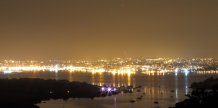Articles

The skyglow over Plymouth. Image by James P. Duffy.
New research highlights impacts of light pollution on marine life
A researcher at the University of Exeter has published research focusing on the many impacts of artificial light pollution on marine environments worldwide.
, from the University’s Penryn-based Environment and Sustainability Institute (ESI), is part of a team investigating light pollution’s effects on the environment; while research into its effects on terrestrial ecosystems has been progressing for many years, specifically marine-based research is a newer phenomenon.
A 2010 estimate cited 22.2% of the world’s coastlines (excluding Antarctica) as being exposed to nightly artificial light pollution. This was an average which encompassed the extremes of Oceania and Russia at one end of the scale (7.9 and 6.1% of their coastlines affected, respectively) and Europe (54.3%) at the other end.
The vast majority of species have evolved under natural and predictable regimes of moonlight, sunlight and starlight. These natural rhythms dictate a whole range of behaviours, from predation and communication to navigation, maturation and reproduction.
Dr Davies’ research reveals just how comprehensive and all-encompassing the effects on marine ecosystems can be. Birds which use natural light to navigate, turtle hatchlings disoriented by coastal light, the effects of artificial skyglow on plankton migration, fish gathering under pier lights leading to increased predation: the research shows the variety of ways in which ecosystems are being changed by artificial light.
Working out the ecological ramifications of light pollution is complicated, much more research – and a firmer evidence base – is needed. Artificial light at night is potentially damaging to some of the world’s most biologically diverse and functionally important marine ecosystems, and, as such, should be considered a threat to human wellbeing. Dr Davies’ research says that precautionary measures should be taken to minimise the ecological impacts of light pollution in marine environments wherever possible and, where statutory tools are lacking, voluntary codes of practice and using incentives to preserve naturally lit areas through dark skies initiatives should be encouraged as preventative measures.
Dr Davies says: ‘It’s incredible that we’ve been lighting up marine ecosystems at night for some time, with little thought for how it might be affecting the behaviour, reproduction and survival of their species. Light pollution has already been shown to have a diverse range of effects on marine organisms. This research highlights that these effects may be widespread across many species, including some of the world’s most protected such as corals. Given the number of pressures our marine ecosystems are already facing, such as exploitation, global warming and ocean acidification, it’s really important that light pollution isn’t overlooked.’
You can read the article in full here, or, if you'd prefer, download it here: The Nature, extent and ecological implications of marine light pollution. Dr Davies will be discussing this issue with Monty Don for BBC Radio 4's 'Shared Planet' soon; we'll announce details soon of when it's to be aired.
The ESI is working with businesses and enterprises across all sectors of the economy in Cornwall, the Isles of Scilly and beyond to translate research and expertise into innovative business practices, products and services in order to respond to the challenges of environmental change. It has been funded by the European Regional Development Fund Convergence Programme (£22.9M) and the South West Regional Development Agency (£6.6M), with significant support from the Higher Education Funding Council for England.
Date: 5 September 2014
